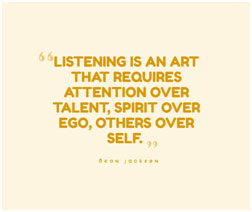Listening is the first step in communication
Jan

A mother was walking with her son. Soon, they came across a street performer who was about to start his performance, so they took a place and started enjoying his performance. As the performance progressed, people started to congregate around the performer. After sometime, the three-year-old son started to cry and tug at his mother’s hand. The mother was enjoying the show, and got irritated by her son, who was now constantly distracting her.
After some time, she bent down and started scolding her son for misbehaving. While she was bent on her knees and scolding her son, she realised that from that height, it was not possible to see the performer as some other people had come and taken their place, blocking her son’s view. She was fairly tall and could see, but the son couldn’t.
Only then did she realise why he was crying, so she picked up her son, and he could enjoy it again.
In our lives, we need to keep reminding ourselves that we need to be sensitive to others around us, so we can understand their position, and do what it takes to help them.
Similarly, we need to do what we can to sensitise others of our situation, so they realise our situationand do what they can to help us.
Great leaders like Mahatma Gandhi, Nelson Mandela, Mother Teresa and Martin Luther King Jr. are exemplary personalities from whom we can learn and develop the unique human endowment to communicate effectively, moving away from the fight or flight mode, thus, creating inclusive relationships.
Nelson Mandela in an interview with Oprah Winfrey shared how he successfully transformed himself from a violent person, to a benevolent leader while he served his prison term for 27 years. Oprah asked him as to how he could forgive the racist oppressors, and he answered,“We made our brain dominate over our blood, for we realised that if we keep on the revenge path, the country will be engulfed in rivers of blood, and we wanted to contribute towards creating a just society in the limited time they had.”
In an interview in the Time Magazine, Mandela was asked,“When you decided to suspend the struggle was it because you realised you did not have the strength to overthrow the government or that you knew you could win over international opinion by choosing non-violence?”
Mandela answered,“Why not both?” He developed the ability to deal with contradictions. He became a pragmatic leader what is the end that I seek and what is the most practical way to get there?
By putting himself in the position of the white minorities, he worked towards a peaceful solution, and prevented radicals from taking over, which lead to an integration of whites and blacks in South Africa.
